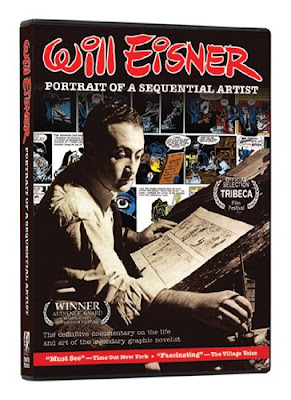 I reviewed this documentary when I saw it in 2008 at a film festival in Toronto. The film is now available on DVD and Blu-ray. I recommend it, not only because it is an excellent film, but also due to the extras, which I'll get to below.
I reviewed this documentary when I saw it in 2008 at a film festival in Toronto. The film is now available on DVD and Blu-ray. I recommend it, not only because it is an excellent film, but also due to the extras, which I'll get to below.While Will Eisner never worked in animation, his career in comics focused on how to tell stories visually, which makes him relevant to the challenges facing animators. The documentary covers Eisner's career, which broke down into surprisingly well-defined periods. In the 1930s, Eisner was a pioneer in the comic book business, starting in the period before Superman became a massive hit. In addition to writing, drawing and editing comics, Eisner created a factory for turning out pages, a system he admitted was influenced by the Disney studio.
In 1940, Eisner was given the opportunity to create a comic book for newspaper syndication and his creation, The Spirit, provided him with a laboratory for his experiments in layout and panel breakdowns. Because he was addressing the newspaper, and not the younger comic book, audience, he pushed The Spirit into a more mature treatment of the detective genre. The Spirit was also a landmark in a business sense, as Eisner retained ownership of the strip when the standard was for a strip's creator to be employed by a distribution syndicate which held the copyright to the strip.
During World War II, Eisner was involved with using comics to teach equipment maintenance in a magazine called Army Motors. While he continued The Spirit after the war, by the early 1950s, Eisner focused exclusively on comics as a teaching tool, continuing his relationship with the military with P.S. Magazine, showing soldiers visually how to use and maintain their gear.
In the 1960s, Eisner discovered the burgeoning fandom for comics and he allowed The Spirit to be reprinted by several publishers. In the '70s, Eisner was one of the first to explore the idea of original graphic novels with his book A Contract With God. He dedicated the rest of his life to the creation of new works, including several autobiographical novels about growing up in New York and the early days of the comic book business.
The documentary covers all these periods with examples of Eisner's artwork and interviews with cartoonists who are his contemporaries and the later generations he influenced. On camera interviews include Jules Feiffer, Joe Kubert, Gil Kane, Art Spiegelman, Frank Miller, Neil Gaiman, and Scott McCloud.
Late in his career, Eisner interviewed several cartoonists for the purposes of comparing notes on how they approached their stories. These interviews were printed in various magazines devoted to Eisner's work and then collected in a book called Will Eisner's Shop Talk. Those audio interviews with artists such as Harvey Kurtzman, Jack Kirby, Gil Kane, Joe Kubert, Neal Adams and others are extras on this DVD, and for me, they alone are worth the price of the disk.
Whether you're interested in comics history, visual storytelling, or the business side of creating stories, Eisner's life and this documentary have something to offer.


